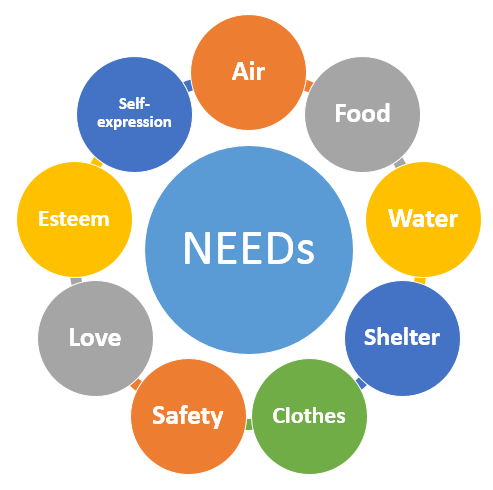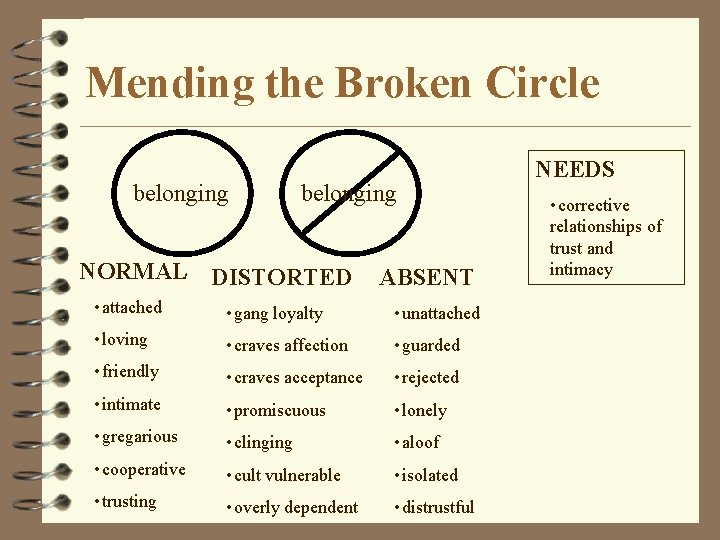
How can God’s love survive in a man who has enough of this world’s goods yet closes his heart to his brother when he sees him in need? Let us love in deed and not merely talk about it.
1 John 3:17
Needs and Values
Two of the fundamental motivating forces within every human person are Needs and Values. These two dynamics collaborate as an interdependent matrix that shapes our perceptions, thought, attitudes, behaviours. The intricacies of this matrix of dynamics, is further influenced by the degree to which we are conscious or unconscious of our needs at work in us, the influence of what has shaped our patterns of reaction in the past (what we named as Intuitive Appraisal in the first Section of these reflections), the source and focus of the values we aspire to, and level of coherence that we have between our actual lived behaviour and what we aspire to value.
There are moments when we recognise the consistency that exists between our needs and values, and we rightly feel a sense of goodness within. Equally however, we know the moments of inconsistency and like St. Paul we can say, “I have the desire to do what is good, but I cannot carry it out. For I do not do the good I want to do, but the evil I do not want to do — this I keep on doing” (Romans 7:18-19).
How do we, as Missionaries of the Sacred Heart, understand this complicated dynamic between our needs and our values at work within us all, in such a way that it enables us to better serve the mission given to us.
In a constant effort to share in the sentiments of the Heart of Christ, we will be attentive to all human needs and aspirations, such as, the need to be respected as persons, the need for love and peace, for freedom, justice and truth, and the search for meaning in life. We will become all things to all people, by respecting different cultures, and by being ready to undertake whatever apostolic services people may need.
MSC Constitutions & Statutes #24

Values
If the Missionary of the Sacred Heart wants to make his work and words effective, he must imitate his divine model who, the Gospel tells us, began by doing, then by teaching. It is after having passed his life in the practice of all the virtues that Our Lord says to us: “Happy the poor, happy those who suffer persecution in the cause of justice, happy the gentle etc”. People understand his language. The Missionary of the Sacred Heart must be the same.
Jules Chevalier, 1855 (MSC Constitutions & Statutes p4.)

We are all drawn towards an ideal image of self. An image of the kind of person we would like to be. This image is governed by what we value, or see as important in our lives. The values behind this ideal-self give us guidance and call us to seek truth, integrity, authenticity, simplicity, right relationship, confidence, and many other potential values.
Some values are basic to healthy human life and are called Natural or Human Values.
Other values go beyond what is healthy, and these values concern the spiritual or moral dimensions in life. These values draw us towards what is beyond ourselves, towards God, and are therefore called Self-Transcending Theo-Centric values.
| Stop for a moment and make a list of some examples of Natural Values you may be aware of? | |
| Now list some examples of Self-transcending Theo-centric Values? |
Needs

While we aspire to live an ideal life, shaped by what we value, we live with the inescapable reality of our human limitations. This is the life of our real, or actual self. This is who we are with all our needs and all that goes to make up our identity and personality – who we really are regardless of what we aspire to.
Central to our actual self is our basic human needs. I need to eat and drink, I need shelter, I need affection, love, comfort, I need reassurance in times of self-doubt, I need many, many things, and I can’t just ignore what I need. In fact, a need is defined as something that is necessary for an organism to live a healthy life. In the case of a need, a deficiency causes a clear adverse outcome: a dysfunction or death. In other words, a need is something required for a safe, stable and healthy life (e.g. air, water, food, land, shelter).
In addition to basic needs, humans also have needs of a social or societal nature such as the human need to socialise or belong to a family unit or group. Needs can be objective and physical, such as the need for food, or psychical and subjective, such as the need for self-esteem.
| Write a list of some examples of my Needs? |
Unmet, Inflated and Distorted Needs
Would that we fully understood the sublimity of the ministry given us! May the Sacred Heart of Jesus be everywhere loved. Our Lord Jesus Christ has opened his Heart to the world in order to bring an effective remedy to modern societies that are rushing into an abyss. And we are those whom he has sent to apply this remedy to the world.
Jules Chevalier, 1900
Some of our basic needs were never met during the early years of our lives. For example, we needed affection, but did not have our need for affection met in any substantive way and so the need remains unmet within us. This remaining unconscious ‘memory‘ of an emotional deficiency, is felt in such a way, that the organism of the body continues to feel that something is missing. So, we continue at some level to hanker for the fulfilment of that need.
Sometimes needs are over-compensated, or over-met, and a person may grow up not knowing how to live with less of these needs being met. So, the craving for their needs is inflated. In this way the so called ‘spoilt-child’ disposition is created and the inflated need becomes overly demanding later in life. If at the same time the personality is developing, the individual may come to identify themselves with the over-compensation and it may well become a marker of their personal identity, “who I am is what I need”. Behaviour may be influenced by this and a healthy separation of one’s self, from the inflated need is very challenging.

The meeting of other needs may be damaged by traumatic experiences in life, causing the need and the meeting of that need to become distorted. An child may have longed for love from a significant adult. The adult in turn showers that child with affection and attention, but within the context of some form of domestic abuse. The child grows up confusing the experience of ‘love’, with the experience of ‘affection’ or ‘getting attention’, or worse still with the experience of ‘abuse or violence’. What the child seeks and what they think they are getting are not the same thing. But as the child does not at this age have the capacity to make a rational distinction between the two, the need and what is actually given can’t be separated. For this child their need for love may become confused with something unwanted and even harmful. This distortion stays alive in the individual into adulthood unless the opportunity arise for that separation to occur consciously. This conscious process of separation we call healing. Some other examples include, a child is hungry (needs food) and is fed food that is detrimental to health, the confusion that results is between what constitutes a healthy diet and what satisfies the need. The confusion between real love and the need for being appreciated or feeling worthwhile. The distortion that results when the need for acceptance is confused with punishment and obedience.
There are many other examples of need deficiency, inflation and distortion that can be seen in the lives of us all. When needs are not met in a healthy and mature way, the needs develop into lasting patterns we call compulsions. Below is an article which explains this process of the development an influence of compulsion in us.
| What might be some examples of your own unmet needs? | |
| What might be some examples of your own inflated needs? | |
| What might be some examples of your own distorted needs? |
We all have needs. Whether those needs are distorted in some way or not we still have needs. Needs are essential to human existence. Without them we would not feed ourselves, protect ourselves, or ever wash. However, if we are not able to meet our needs in some healthy way, we find unhealthy ways to meet them, because needs must be met. Our needs keep us alive.
Importantly, we are only conscious of some of our needs. Many of our needs remain unknown to us within the unconscious content of our psyche and inaccessible to our daily decision making. It is not the fact that we have needs that causes ourf our problems, but how they drive or push us to meet them unconsciously that lands us in compromising situations.
| What are some of the compromising situations I have found myself in? |
Let us look at each of these motivational forces Values and Needs, in more detail. In the next section of these reflections we will consider the various values, that mould and shape our whole life of faith as MSC, what Jules Chevalier calls the sentiments of the Heart of Christ.
A religious who would refuse to take part in the progressive development of human knowledge would certainly create disastrous gaps in his formation. But what is knowledge without a devout faith? A sounding cymbal. Thus it is necessary above all that a Missionary of the Sacred Heart become a man of faith and of sacrifice.
Jules Chevalier, 1901
